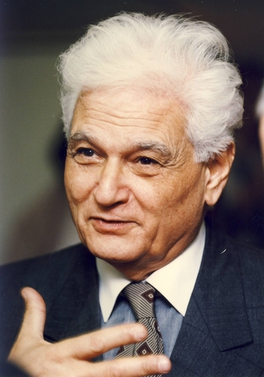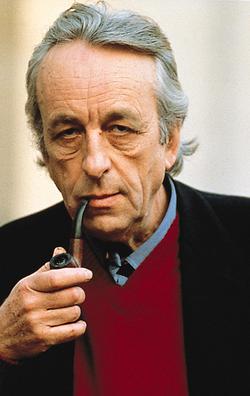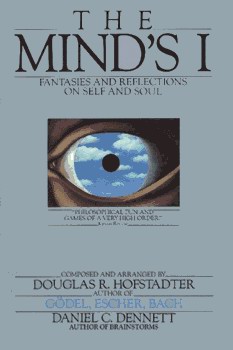Related Research Articles
The Chinese room argument holds that a digital computer executing a computer program cannot have a "mind", "understanding", or "consciousness", regardless of how intelligently or human-like the program may make the computer behave. Philosopher John Searle presented the argument in his paper "Minds, Brains, and Programs", published in Behavioral and Brain Sciences in 1980. Gottfried Leibniz (1714), Anatoly Dneprov (1961), Lawrence Davis (1974) and Ned Block (1978) presented similar arguments. Searle's version has been widely discussed in the years since. The centerpiece of Searle's argument is a thought experiment known as the Chinese room.

Jacques Derrida was a French philosopher. He developed the philosophy of deconstruction, which he utilized in a number of his texts, and which was developed through close readings of the linguistics of Ferdinand de Saussure and Husserlian and Heideggerian phenomenology. He is one of the major figures associated with post-structuralism and postmodern philosophy although he distanced himself from post-structuralism and disowned the word "postmodernity".

Hilary Whitehall Putnam was an American philosopher, mathematician, computer scientist, and figure in analytic philosophy in the second half of the 20th century. He contributed to the studies of philosophy of mind, philosophy of language, philosophy of mathematics, and philosophy of science. Outside philosophy, Putnam contributed to mathematics and computer science. Together with Martin Davis he developed the Davis–Putnam algorithm for the Boolean satisfiability problem and he helped demonstrate the unsolvability of Hilbert's tenth problem.

Louis Pierre Althusser was a French Marxist philosopher who studied at the École normale supérieure in Paris, where he eventually became Professor of Philosophy.

John Rogers Searle is an American philosopher widely noted for contributions to the philosophy of language, philosophy of mind, and social philosophy. He began teaching at UC Berkeley in 1959, and was Willis S. and Marion Slusser Professor Emeritus of the Philosophy of Mind and Language and Professor of the Graduate School at the University of California, Berkeley, until June 2019, when his status as professor emeritus was revoked because he was found to have violated the university's sexual harassment policies.

The Mind's I: Fantasies and Reflections on Self and Soul is a 1981 collection of essays and other texts about the nature of the mind and the self, edited with commentary by philosophers Douglas R. Hofstadter and Daniel C. Dennett. The texts range from early philosophical and fictional musings on a subject that could seemingly only be examined in the realm of thought, to works from the twentieth century where the nature of the self became a viable topic for scientific study.

David John Chalmers is an Australian philosopher and cognitive scientist specializing in the areas of the philosophy of mind, and the philosophy of language. He is a professor of philosophy and neural science at New York University, as well as co-director of NYU's Center for Mind, Brain and Consciousness. In 2006, he was elected a Fellow of the Australian Academy of the Humanities. In 2013, he was elected a Fellow of the American Academy of Arts & Sciences.
The year 1980 in science and technology involved some significant events, listed below.
A philosophical zombie is a being in a thought experiment in philosophy of mind that is physically identical to a normal human being but does not have conscious experience.
Synthetic intelligence (SI) is an alternative/opposite term for artificial intelligence emphasizing that the intelligence of machines need not be an imitation or in any way artificial; it can be a genuine form of intelligence. John Haugeland proposes an analogy with simulated diamonds and synthetic diamonds—only the synthetic diamond is truly a diamond. Synthetic means that which is produced by synthesis, combining parts to form a whole; colloquially, a human-made version of that which has arisen naturally. A "synthetic intelligence" would therefore be or appear human-made, but not a simulation.

John Richard Perry is a professor at Stanford University and the University of California, Riverside. He has made significant contributions to philosophy in the fields of philosophy of language, metaphysics, and philosophy of mind. He is known primarily for his work on situation semantics, reflexivity, indexicality, personal identity, and self-knowledge.
The philosophy of artificial intelligence is a branch of the philosophy of mind and the philosophy of computer science that explores artificial intelligence and its implications for knowledge and understanding of intelligence, ethics, consciousness, epistemology, and free will. Furthermore, the technology is concerned with the creation of artificial animals or artificial people so the discipline is of considerable interest to philosophers. These factors contributed to the emergence of the philosophy of artificial intelligence.

In the philosophy of mind, the China brain thought experiment considers what would happen if each member of the Chinese nation were asked to simulate the action of one neuron in the brain, using telephones or walkie-talkies to simulate the axons and dendrites that connect neurons. Would this arrangement have a mind or consciousness in the same way that brains do?
The symbol grounding problem is a concept in the fields of artificial intelligence, cognitive science, philosophy of mind, and semantics. It addresses the challenge of connecting symbols, such as words or abstract representations, to the real-world objects or concepts they refer to. In essence, it is about how symbols acquire meaning in a way that is tied to the physical world. It is concerned with how it is that words get their meanings, and hence is closely related to the problem of what meaning itself really is. The problem of meaning is in turn related to the problem of how it is that mental states are meaningful, and hence to the problem of consciousness: what is the connection between certain physical systems and the contents of subjective experiences.
In philosophy of mind, the computational theory of mind (CTM), also known as computationalism, is a family of views that hold that the human mind is an information processing system and that cognition and consciousness together are a form of computation. Warren McCulloch and Walter Pitts (1943) were the first to suggest that neural activity is computational. They argued that neural computations explain cognition. The theory was proposed in its modern form by Hilary Putnam in 1967, and developed by his PhD student, philosopher, and cognitive scientist Jerry Fodor in the 1960s, 1970s, and 1980s. It was vigorously disputed in analytic philosophy in the 1990s due to work by Putnam himself, John Searle, and others.

Biological naturalism is a theory about, among other things, the relationship between consciousness and body, and hence an approach to the mind–body problem. It was first proposed by the philosopher John Searle in 1980 and is defined by two main theses: 1) all mental phenomena, ranging from pains, tickles, and itches to the most abstruse thoughts, are caused by lower-level neurobiological processes in the brain; and 2) mental phenomena are higher-level features of the brain.

Louis Althusser and the Traditions of French Marxism is a 2005 book about the French philosopher Louis Althusser by William S. Lewis. The book received positive reviews. Lewis was complimented for his inclusion of translated documents of the French Communist Party.

Gualtiero Piccinini is an Italian–American philosopher known for his work on the nature of mind and computation as well as on how to integrate psychology and neuroscience. He is Curators' Distinguished Professor in the Philosophy Department and Associate Director of the Center for Neurodynamics at the University of Missouri, St. Louis.

The correct place of Karl Marx's early writings within his system as a whole has been a matter of great controversy. Some believe there is a break in Marx's development that divides his thought into two periods: the "Young Marx" is said to be a thinker who deals with the problem of alienation, while the "Mature Marx" is said to aspire to a scientific socialism.

Hélène Rytmann was a French revolutionary and sociologist. She was active as a Communist militant in the French resistance to Nazism. A member of the French Communist Party, she was expelled after accusations of Trotskyism and having participated in summary executions of former Nazi collaborators.
References
- ↑ "Louis Althusser". Stanford Encyclopedia of Philosophy. Retrieved 23 January 2013.
- ↑ Searle, John (1980). "Minds, Brains, and Programs" (PDF). Behavioral and Brain Sciences. 3 (3): 417–424. doi:10.1017/s0140525x00005756. S2CID 55303721.